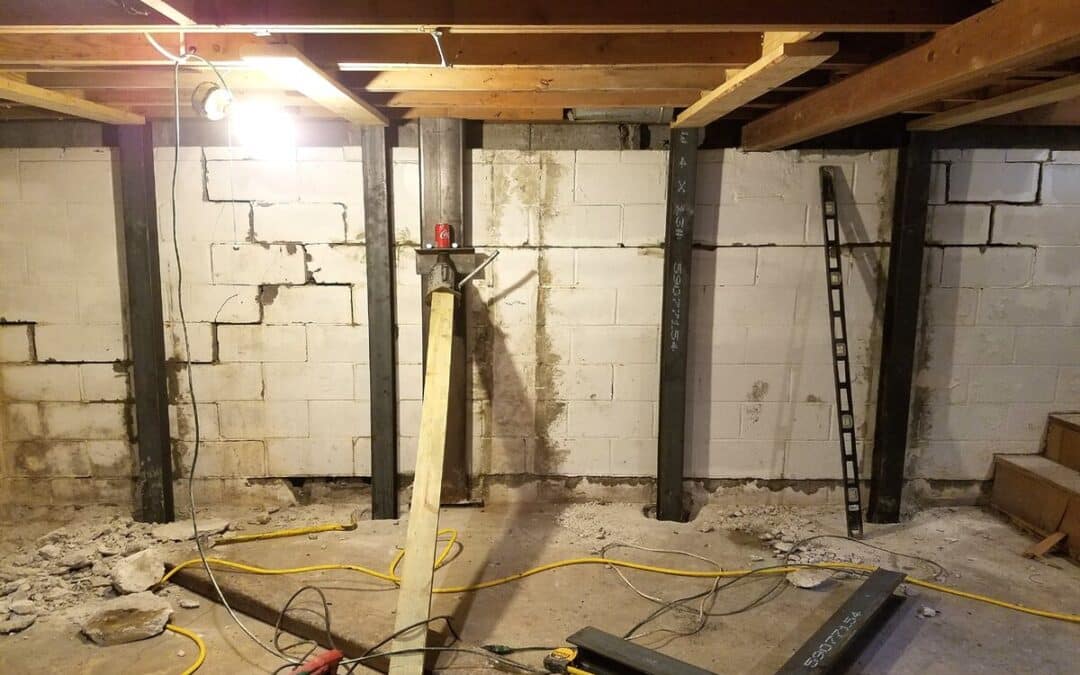Basement walls are a critical part of your home’s foundation. When they start to show signs of stress such as cracks, bowing, or leaning, it often means there is a structural issue that needs attention. These problems can worsen over time if left unaddressed, leading to more expensive repairs and safety concerns. The following guide covers the top indicators your basement walls may need stabilization and what you can do about it.
Top Indicators Your Basement Walls Need Stabilization
Basement walls are crucial to the structural integrity of your home. Over time, various factors can compromise their stability. Being vigilant about the following signs can help you determine when it’s time to consider basement wall stabilization:
1. Visible Cracks
Cracks in basement walls are among the most common signs of potential issues. These can manifest in several forms:
- Horizontal Cracks: Often indicate pressure from the exterior soil pushing against the wall.
- Vertical Cracks: May result from the foundation settling unevenly.
- Diagonal or Stair-Step Cracks: Typically found in block or brick foundations, suggesting differential settlement or shifting.
While small, hairline cracks might not be immediate causes for concern, larger or widening cracks should be addressed promptly.
2. Bowing or Leaning Walls
When basement walls begin to bow or lean inward, it’s a clear indication of structural stress. This deformation is usually caused by external pressures, such as:
- Hydrostatic Pressure: Accumulated water in the soil surrounding the foundation exerts force on the walls.
- Expansive Soils: Certain soils expand when wet and contract when dry, leading to cyclical pressure on basement walls.
If left unaddressed, bowing walls can lead to structural failure.
3. Water Seepage and Damage
Moisture intrusion is both a symptom and a cause of basement wall issues. Signs include:
- Damp Spots or Stains: Indicate water is penetrating the wall.
- Efflorescence: A white, powdery residue left by evaporated water, signaling moisture issues.
- Mold Growth: Thrives in damp environments and can pose health risks.
Addressing water-related issues is crucial to maintaining wall stability and indoor air quality.
4. Sticking Doors and Windows
Difficulty in opening or closing doors and windows, especially in the basement, can be a sign of foundation movement. As walls shift or settle, they can distort door and window frames, leading to:
- Misalignment: Gaps or unevenness around frames.
- Sticking or Jamming: Doors and windows that are hard to operate.
These functional issues often point to underlying structural problems.
5. Floor and Ceiling Gaps
Gaps appearing between the basement walls and the floor or ceiling can indicate that the walls are moving or settling. This movement can compromise the structural integrity of the entire home.
- Floor Separation: A noticeable gap where the wall meets the floor.
- Ceiling Gaps: Spaces between the top of the wall and the ceiling, suggesting upward or downward wall movement.
Such gaps warrant immediate attention to prevent further structural damage.
Causes of Basement Wall Instability
Understanding the root causes of basement wall issues is essential for effective remediation. Common factors include:
Hydrostatic Pressure
Water accumulation in the soil around the foundation increases pressure on basement walls, leading to cracks and bowing. Proper drainage systems can mitigate this issue.
Soil Expansion and Contraction
Soils rich in clay expand when wet and contract when dry, exerting fluctuating pressure on foundation walls. Over time, this can cause walls to bow or crack.
Poor Construction Practices
Inadequate reinforcement, substandard materials, or improper backfilling during construction can compromise wall integrity, making them susceptible to movement and damage.
Why Choose Foundation 1
At Foundation 1, we specialize in diagnosing and addressing basement wall stabilization issues. Our team employs advanced techniques and high-quality materials to ensure lasting solutions. We understand the importance of your home’s structural integrity and are committed to restoring and preserving it. With our expertise, you can trust that your basement walls will be reinforced effectively, providing peace of mind for years to come.
In Summary
Recognizing the signs that your basement walls need stabilization is crucial for maintaining your home’s safety and value. If you’ve observed any of the indicators mentioned, it’s essential to consult with professionals promptly.
At Foundation 1, we offer thorough assessments and tailored solutions to address your specific needs. Contact us today to ensure your home’s foundation remains strong and secure.

